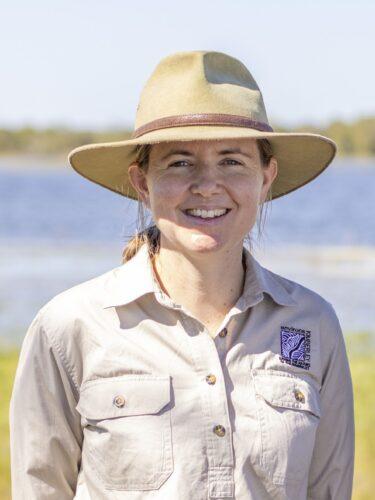 Dr Michelle Pyke
Dr Michelle Pyke
Research Fellow, University of Western Australia. Project Officer, Environs Kimberley.
See Dr Pyke’s full research profile here.
E: michelle.pyke@uwa.edu.au
Bio
Across the north, Indigenous ranger teams are managing and monitoring wetlands on their Country. Michelle’s research focuses on helping Traditional Owner groups elevate their own ways of conceptualising and managing wetlands in this process. She is also interested in exploring the different outcomes for people and nature that result when wetland work is directed by Traditional Owners rather than conventional natural resource management, or scientific, ways of knowing and doing. Michelle is employed by both UWA and Environs Kimberley.
Research outputs linked to policy change and decision-making
- 2019 – 2020 and 2022 – 2024 Kimberley Wetlands Project. Over four-years, the Kimberley Wetlands Project was funded by Lotterywest, supported by the National Environmental Science Program Northern and Resilient Landscapes Hubs, and saw a collaboration between UWA, Environs Kimberley and seven Kimberley Indigenous ranger teams. The Kimberley Wetlands Project supported each ranger team to navigate stages of the adaptive management cycle for wetlands, particularly guided by Healthy Country Planning steps (adapted from The Open Standards for the Practice of Conservation). Support was tailored according to each ranger group’s needs, each being at a different stage of the adaptive management cycle. Foci included, for example, development of new monitoring programs, and assisting with data collation, analysis, interpretation and communication products for existing programs.
- 2022 – 2023 Collaborative development of a cultural wetland assessment protocol (UWA Research Collaboration Award, Michelle as ECR / project leader). This collaboration between Bardi Jawi traditional owners and Indigenous rangers, UWA, Environs Kimberley and a Maori expert developed a wetland monitoring program for Bardi Jawi Country, based on Bardi Jawi ways of understanding wetlands and their health. Development of the wetland monitoring program followed the Healthy Country Planning adaptive management framework and was centred around five ‘attributes’ of (or ‘main things’ underpinning) wetland health identified by Bardi Jawi Elders.
- 2018 – 2022 Developing a Yawuru bilarra (wetland) monitoring program. Michelle assisted on a Northern Environmental Science Program (NESP) project to collaboratively develop a bilarra (wetland) monitoring program for the Yawuru Indigenous Protected Area (IPA) in the Kimberley region. The monitoring program, shaped by Yawuru knowledge of bilarra ecology and values, is currently being used to support the Country Managers to assess sustainable cattle grazing operations on the IPA, and whether they are achieving their IPA objectives for protecting wetlands.
- 2013 – 2017 Cultural systems, science and natural resource management: Aboriginal management of wetlands in the west Kimberley, Australia (PhD, UWA). Michelle worked with the Bardi Jawi and Nyul peoples of the Dampier Peninsula, Kimberley region, north of Broome, to investigate Australian Aboriginal conceptualisations of wetland management. Since this research, Michelle has been passionate about elevating Australian Aboriginal beliefs, knowledge and practices in wetland management, in the context of the Indigenous Ranger program.
- 2012 – 2016 Nyul Nyul Freshwater Research and Monitoring Project (National Environmental Research Program Northern Australia Hub). Through funding from the NERP Northern Australia Hub and the Hermon Slade foundation, researchers from UWA, Griffith University, and I-Tracker staff from the North Australian Indigenous Land and Sea Management Alliance Ltd (NAILSMA) worked with the Nyul Nyul Rangers to study wetlands on Nyul Nyul country. The project delivered the Nyul Nyul freshwater management and monitoring plan, which guided wetland monitoring by the Nyul Nyul Rangers for a decade (receiving support for data analysis, interpretation and communication in the Kimberley Wetlands Projects, see above). Michelle’s role was to investigate and document Nyul Nyul knowledge of the wetlands under investigation, and collaboratively support conceptual understanding of the wetlands based on this Nyul Nyul knowledge along with the scientific findings (multiple-evidence based approach).
Current academic employment and positions
- 2019–present: Project officer, supporting Indigenous contributions to wetland monitoring and management, Environs Kimberley.
- 2018 – 2023: Research Associate, School of Agriculture and Environment, The University of Western Australia.
Highest qualification
- 2017: PhD in Geography, The University of Western Australia
Major prizes, medals and honours
- 2008: Northern Territory Young Achiever Environment Award
My Projects
 Current project
Current project Completed project
Completed project
NESP RLH, 2021-2027NESP, 2015-2021NERP, 2012-2015TRaCK, 2005-present
 Dr Michelle Pyke
Dr Michelle Pyke